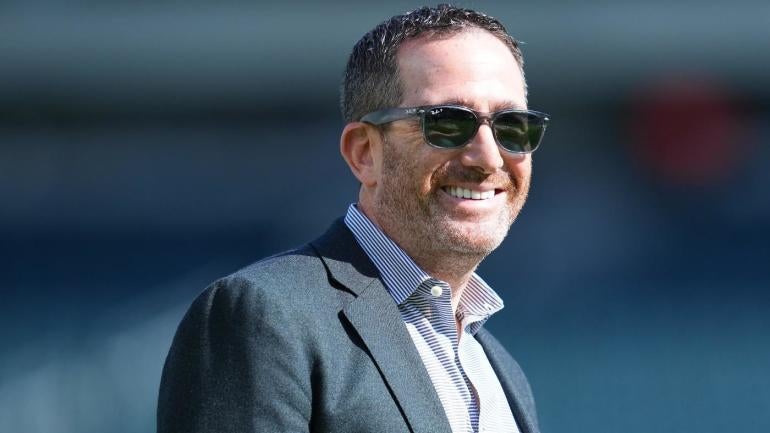
When mentioning salary cap space and the Philadelphia Eagles, there are typically more questions than answers. How can the Eagles afford all these players? How do the Eagles create so much cap space every year? Why is the cap arbitrary for the Eagles and not other teams?
Thanks to the Eagles, the pundits question whether the salary cap is a myth. Eagles general manager Howie Roseman is just good at manipulating it, continuing to use the business of the NFL to his advantage.
How is Roseman able to create salary cap space every year, making the Eagles annual players in free agency in the process? The Eagles certainly don't run their front office like the New Orleans Saints, Los Angeles Chargers and Dallas Cowboys -- and it shows.
Contracts heavy on the back end
The average annual salary is what the contract shows, yet the Eagles structure their contracts that have high salary cap hits toward the end of the deal and low cap numbers at the start of the contract. That's at least the case for the free agent signings and trade acquisitions based on the contracts over the past few years (contracts via Over The Cap).
- Saquon Barkley: $3,905,882 cap hit in year one after signing a three-year, $37.75 million deal. Cap hit is $15.575 million in year three.
- A.J. Brown: $8,318,894 cap hit in year one after signing a four-year, $100 million extension. Cap hit is $41,505,895 in year four.
- Haason Reddick: $3,878,000 cap hit in year one after signing a three-year, $45 million deal. Cap hit is $21.827 million in year three.
Voided years
The Eagles have plenty of fake contract years in contracts as a way to create cap space. The void years push back salary cap charges so that when the player's contract expires, the salary in the void years of the contract account for that season. Haason Reddick, for example, has a void year of $14.688 million in 2025 -- even though he's not under contract. If the Eagles let Reddick leave in free agency, they are accountable for that $14.688 million.
The voided years allow the Eagles to spread out cap space over the life of a contract, and well after the deal ends. If any player has void years in their contract and they are not re-signed before the contract voids, the remaining money from the void years gets transferred into dead money for the next season.
Restructured deals
The Eagles like to convert a portion of a player's base salary or roster bonus into a signing bonus, thus creating immediate cap space to make moves. Base salaries and roster bonuses count in full against the cap, but signing bonuses are prorated over the life of a contract.
The players get their money immediately in roster bonuses and signing bonuses, instead of weekly pay over the course of the year. Depending on how much of the player's salary the team wants to convert into a roster or signing bonus, that's how much the team saves in salary cap space. In turn, it frees up salary cap space to sign other players.
Recent contracts the Eagles have restructured are Jordan Mailata, Darius Slay, Lane Johnson and Jake Elliott. For some players, they'll restructure the contracts on multiple occasions in order to retain the player on the roster and add more talent going forward.
Dead money
Dead money is the amount of money which still needs to be accounted for on the salary cap after the player's contract is no longer in effect. Basically, it's money the player has been paid but hasn't been accounted for on the salary cap.
The Eagles don't have a lot of dead money -- only $16,384,435 (which is 16th in the NFL). Avonte Maddox has the highest amount of dead money after his release last week ($7,719,535), followed by Derek Barnett ($4,004,766), Marcus Mariota ($3.068 million) and Kevin Byard ($1.386 million).
Just three years ago, the Eagles had over $50 million in dead money due to releasing players early in their contracts (Carson Wentz, Alshon Jeffery, Malik Jackson, DeSean Jackson). Last year, the Eagles actually had $54.73 million in dead cap space (Brandon Brooks' contract was part of that dead cap hit). Recently, the Eagles have made wiser business decisions and are willing to hold on to players a year longer to reduce the dead cap number.
That frees up more money to spend come March, which is why they have been players this free agent season.
Rising salary cap
The NFL is booming, and the Eagles have taken advantage. Backloading contracts has helped the Eagles in future years thanks to the rising cap. The salary cap was $182.5 million in 2021 and has risen to $255.4 million in 2024, a raise of $72.9 million.
The cap has risen by at least 7.9% in each of the last three years. Business is booming in the NFL and the money is piling in, benefitting teams that backend deals like the Eagles. Taking advantage of the league's profits has significantly helped out the Eagles.






















